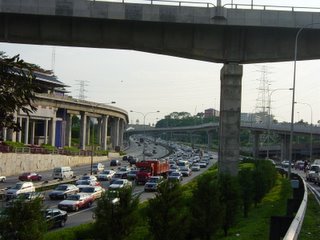
Big new roads and shiny new mass transit systems are popular with politicians everywhere.
Much less popular are many of the key elements in the package of tough choices that is really needed for long-term sustainable urban transport.
Achieving 'successful' urban transport sometimes seems to be all about 'restraint', austerity or denial of 'legitimate aspirations'. Dry rational arguments, especially economics-based arguments) don't excite people’s passions (surprise!).
Transport demand management (TDM) is especially difficult to sell. Taking away space from general traffic to give to public transport seems even harder to sell (witness Bangkok's recent announcement that BRT is again OFF the agenda!).
Yet certain cities HAVE managed to make some of the key tough choices, including restraining private vehicle use and giving substantial road space to public transport, pedestrians and bicycles.
Famous examples in democratic contexts include:
- Bogota: Transmileneo BRT system, improved public realm, traffic restraint, bicycle ways ...
- Seoul: public transport reforms including BRT, pedestrian improvements, reclaiming a river by demolishing an elevated expressway, congestion pricing (on two tunnels) ...
- Curitiba: the 'surface metro' pioneering busway (BRT), pedestrian zones, transit-oriented land use planning ...
- Copenhagen: extensive pedestrianisation and improvements to public realm, central area parking reductions (consistently over many decades), bicycle planning, 30 kph speed limit zones ...
- Zurich: tram priority (low cost approaches to public transport improvement), integrated public transport and its marketing, parking policy, traffic calming and parking restraint...
How did they do it when so many others have failed?
I have a working hypothesis that a focus on POSITIVE VISIONS might be an important aspect of these successes.
For example, ‘democratic public space’ was the dramatic rallying call in Bogotá. The proponents of the transport reforms there went to great lengths to make the changes about getting something good, instead of being about restraint, austerity or denial. Anyone who has heard former Mayor Peñalosa speak can attest to the persuasive power of his arguments in terms of democratic public space. These positive arguments appealed to broad constituencies. Does it have a particular resonance in Latin America's cultural and political landscape? Would this appeal elsewhere?
I should mention that rational arguments do sometimes work. Examples include space-limited and technocratic Singapore and Hong Kong where rather dry efficiency arguments are routinely used to justify policies that are tough on cars. However, I suspect that voters in most places will probably need the appeal of something more positive and exciting to compete with the all-too-obvious private appeal of personal mobility.
Not persuaded by such anecdotal evidence from a tiny sample?
OK, me neither yet. So I would be keen to find out more about the successful (and unsuccessful) arguments that have been prominent in urban transport debates around the world.

No comments:
Post a Comment